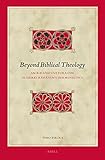Beyond Biblical theology : sacralized culturalism in Heikki Räisänen's hermeneutics / by Timo Eskola.
Material type: TextSeries: Biblical interpretation series ; v. 123.Publisher: Boston : Brill, 2013Description: 1 online resource (xii, 481 pages)Content type:
TextSeries: Biblical interpretation series ; v. 123.Publisher: Boston : Brill, 2013Description: 1 online resource (xii, 481 pages)Content type: - 9789004258037
- 9004258035
- 1306087392
- 9781306087391
- 225.6092 23
- BS2350 .E85 2013eb
- online - EBSCO
| Item type | Current library | Call number | URL | Status | Notes | Barcode | |
|---|---|---|---|---|---|---|---|
 eBook
eBook
|
Biblioteca "Angelicum" Pont. Univ. S.Tommaso d'Aquino Nuvola online | online - EBSCO (Browse shelf(Opens below)) | Online access | Not for loan (Accesso limitato) | Accesso per gli utenti autorizzati / Access for authorized users | (ebsco)658391 |
Includes bibliographical references (pages 457-472) and indexes.
Print version record.
Foreword; Introduction Reading Räisänen's Biblical Criticism in Context; Chapter One From Riccoldo to Reimarus to Räisänen; 1.1. The Significance of Fourteenth Century Quran-criticism; 1.2. Reimarus, the Quran, and the Criterion of Dissimilarity; 1.3. Quran-Criticism, Sachkritik, and the Birth of Liberal Theology; 1.4. Räisänen's Use of Riccoldo's and Reimarus' Principles; 1.5. Contribution to Contemporary Discussion I; Chapter Two A Panorama of Natural Theology: The Chain of Interpretation; 2.1. German Historicism and "Fair Play" in Historical Research.
2.2. Laying the Foundation: On the Authority of the Bible2.3. Quran-Criticism's Significance for the Chain of Interpretation; 2.4. Natural Theology and the Problem of "Experience"; 2.5. Contribution to Contemporary Discussion II; Chapter Three In the Shadow of Weber: Religion as Culture-Culture as Religion; 3.1. Weber on the Sociology of Religion; 3.2. Berger and the Genesis of the Sociology of Knowledge; 3.3. Sacred Canopy: Symbolic Universe as Superstructure; 3.4. Core Experience: Solving the Problem of Historicism; 3.5. On the Paradoxicality of Sociological Structuralism.
3.6. A Case Study: A Psychosocial Reading of Paul3.7. Contribution to Contemporary Discussion III; Chapter Four It is All Signs: Reading Poststructuralism; 4.1. Räisänen and the Linguistic Turn: Against Logocentricism; 4.2. Paul de Man and the Problem of Metalanguage; 4.3. From Deconstruction to Death-of-God Theology; 4.4. Principles of an a/Theology; 4.5. Questioning the System of Psychological Terrorism; 4.6. Contribution to Contemporary Discussion IV; Chapter Five Räisänen's Wolfenbüttelian turn: Dissolving the Old Systema; 5.1. The Disillusionment of Eschatology.
5.2. The Decline of Dogmatics: Anthropology, the Concept of Sin, and Judgment5.3. God, the Problem of Theodicy, and Predestination Theology; 5.4. Reinterpreting the Principles of Religion: Christology, Atonement, and Salvation; 5.5. Confessions as Poetry: On the Way to Universalism; 5.6. Contribution to Contemporary Discussion V; Chapter Six The Debate Over New Testament Theology; 6.1. Reading Gabler; 6.2. From Stendahl to Barr: What Does it "Mean?"; 6.3. The Flow of Existentialist Theology; 6.4. The Resuscitation of Biblical Theology; 6.5. On Narrative Theology.
6.6. History-of-Religion Approach: The Legacy of Wrede6.7. Contribution to Contemporary Discussion VI; Chapter Seven A Chain of Interpretation or a Semiotic Cathedral?; 7.1. Encountering Theissen's Semiotic Theory; 7.2. On Defining Semiotics; 7.3. Consulting Geertz; 7.4. Wittgenstein, Lindbeck, and Theissen; 7.5. Between Semiotic Unity and Ecstatic Pluralism; 7.6. Contribution to Contemporary Discussion VII; Chapter Eight The Rise of Christian Beliefs; 8.1. Choosing between Poststructuralism and Historicism; 8.2. The Rise and Decline of Eschatology; 8.3. On the Human Condition.
Reading Heikki Räisänen's hermeneutics in context, Timo Eskola explores the development of Western New Testament interpretation. Proposing sociology as the link between standard historicism and poststructuralism, Räisänen reinterprets the sociology of knowledge. He substitutes sacralized culturalism for biblical theology.


